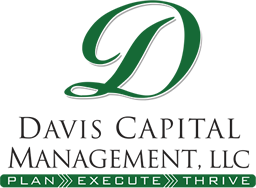If planning your financial future has you overwhelmed with decisions, you’ve probably considered partnering with a professional.
Not all financial designations are created equal. There are rigorous certification programs, and there are some designation-granting programs that can be completed in less than a week.
In order to provide a high level of service, Davis Capital Management in Shelby Twp, MI is a CERTIFIED FINANCIAL PLANNER™ (CFP®) with advanced levels of education. Here’s why a CERTIFIED FINANCIAL PLANNER™ is recognized with high regard for the financial planning profession.

What it Means to be a CERTIFIED FINANCIAL PLANNER™
A CERTIFIED FINANCIAL PLANNER™ undergoes stringent training and experience to obtain certification. When you choose a CERTIFIED FINANCIAL PLANNER™, you’re choosing a highly trained professional that upholds the highest ethical standards while providing a wide array of financial support and resources.
Since 1995, the CFP® board certification program has maintained NCCA accreditation. This means that the CFP® certification meets legal testing requirements.
To attain the right to use the CFP® marks, an individual must satisfactorily fulfill the following requirements:
- Education – Complete an advanced college-level course of study addressing the financial planning subject areas that CFP® Board’s studies have determined as necessary for the competent and professional delivery of financial planning services, and attain a Bachelor’s Degree from a regionally accredited United States college or university (or its equivalent from a foreign university). CFP® Board’s financial planning subject areas include insurance planning and risk management, employee benefits planning, investment planning, income tax planning, retirement planning, and estate planning;
- Examination – Pass the comprehensive CFP® Certification Examination. The examination, administered in 10 hours over a two-day period, includes case studies and client scenarios designed to test one’s ability to correctly diagnose financial planning issues and apply one’s knowledge of financial planning to real world circumstances;
- Experience – Complete at least three years of full-time financial planning-related experience (or the equivalent, measured as 2,000 hours per year); and
- Ethics – Agree to be bound by CFP® Board’s Standards of Professional Conduct, a set of documents outlining the ethical and practice standards for CFP® professionals.
Individuals who become certified must complete the following ongoing education and ethics requirements in order to maintain the right to continue to use the CFP® marks:
- Continuing Education – Complete 30 hours of continuing education hours every two years, including two hours on the Code of Ethics and other parts of the Standards of Professional Conduct, to maintain competence and keep up with developments in the financial planning field; and
- Ethics – Renew an agreement to be bound by the Standards of Professional Conduct. The Standards prominently require that CFP® professionals provide financial planning services at a fiduciary standard of care. This means CFP® professionals must provide financial planning services in the best interests of their clients.
What Does a CERTIFIED FINANCIAL PLANNER™ Do?
A CERTIFIED FINANCIAL PLANNER™ is trained to provide a holistic approach and tailor their services to each individual’s stage in financial planning.
Like an artist who uses their knowledge and tools to create a masterpiece, a CERTIFIED FINANCIAL PLANNER™ offers a broad spectrum of financial planning support to help individuals manage their entire financial picture.
A CFP® is highly knowledgeable in areas such as:
- Risk Management
- Retirement Planning
- Investments
- Tax Planning
- Income and Estate Planning
What is the Difference Between a Financial Advisor and a CFP®?

The primary difference between a financial advisor and a CERTIFIED FINANCIAL PLANNER™ is the NCAA accredited certification that a CFP® holds. CFP® certification requires a strict standard of ethics to be upheld, stringent training and examination, and thousands of hours of experience. This rigorous process ensures CFP®s have the skills and ethical standards to put customers first and install confidence in the financial planning process.
Although the terms advisor and planner are often used interchangeably, a financial advisor does not necessarily have specific designations. Instead, “financial advisor” can be an umbrella term that refers to the different types of financial advisors with varying degrees of training or experience.
When seeking a professional, it can be difficult to tell the difference between a financial advisor and financial planner. This is where designations can help you identify the type of guidance and support a professional provides. More specifically, the CFP® designation will indicate that your financial planner has undergone rigorous education, training and meets ethical standards.
CERTIFIED FINANCIAL PLANNER™ in Shelby Twp, MI
Choosing the right financial planner can be a life changing decision. When you partner with a CERTIFIED FINANCIAL PLANNER™ from Davis Capital Management, you can be confident knowing you have a highly trained professional. Our goal is to create long term relationships with our clients, providing the experience and resources to help you manage your entire financial picture.
Sources:
cfp.net/why-cfp-certification/the-standard-of-excellence
nerdwallet.com/article/investing/certified-financial-planner

